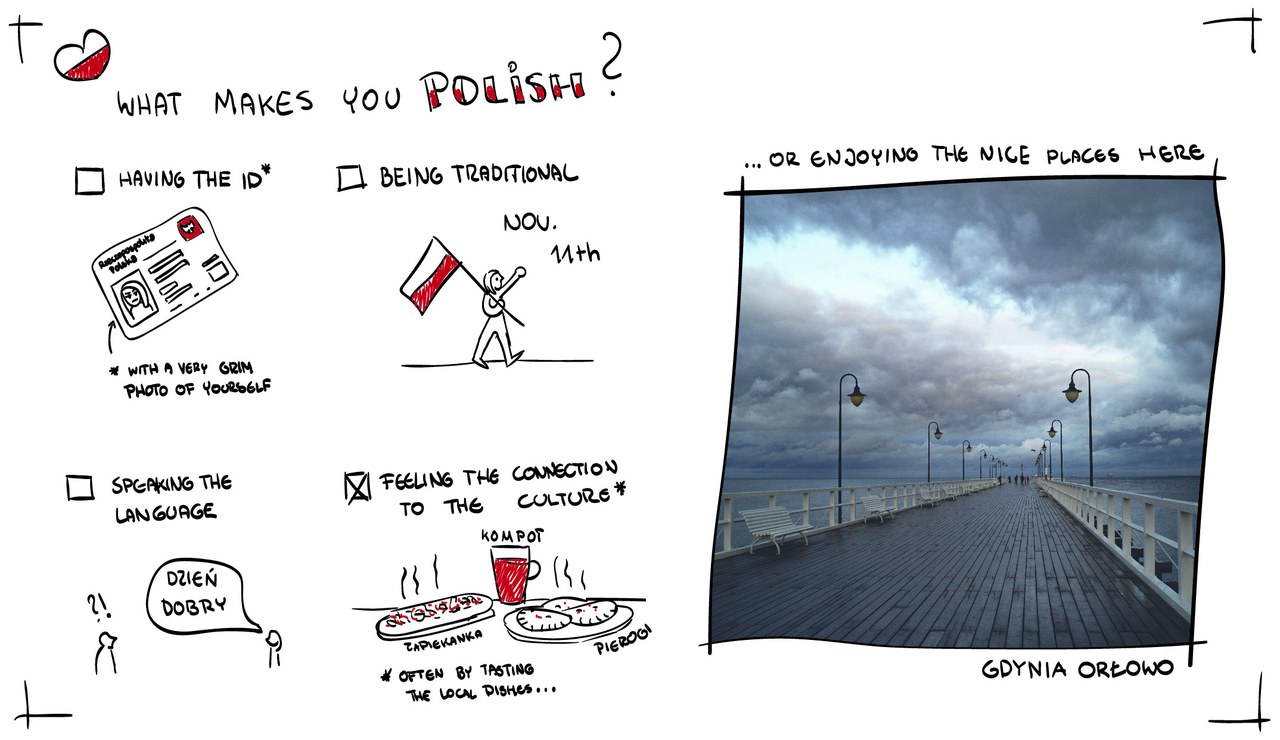POLAND
When students decide to go abroad for studies or for internships, they mostly decide to go to countries or cities which differ from their own culture. For me however, it is different: I decided to visit my home country; Poland. This is the country where I was born and the country I left when I was seven years old. Thinking that I would surely encounter things that are familiar for me, this stay abroad is still about experiencing the new and, in this way, somehow reconnecting with my culture again. But being so close to the culture I consider to belong to, made me realise something very interesting: I might be Polish, but I do not feel completely Polish here.
I’m in Gdansk now, in the very North of Poland, next to the sea, far away from the place where I was born, but anyway still in my home country. I have met quite a lot of interesting people until now, many Poles but also many people with other nationalities. Spending time with them made me figure out that sometimes I behave and think less in a “Polish” way and more like a foreigner. Few examples: many Poles have strong bonds with their traditions, (i.e. celebrating holidays, practicing religion, etc…), Me on the contrary I do not tend to practice these cultural aspects in an extensive way: I do not attend the Sunday mass in the morning or hiss the flag and participate in the parades on independence day (honestly: on this day I went on a trip with my friends - all foreigners). Another example: Poles are quite reserved towards other people, not only with foreigners but also among themselves. Even after knowing each other for a longer time sometimes they do not tend to move on to a further level and establish a relation in a more informal and “friendship-ish” way. At the beginning it was strangely surprising for me to learn that for example lecturers, administrators or other people sometimes do not like to engage in casual talks with you, even after the 100th time of meeting each other.
On the other hand, there is the situation when I meet my other Erasmus-classmates. We go out for lunch, drinks or a city trip and then I feel suddenly like the Polish girl again. I explain to them the traditions, help with translations and advise them when choosing the best national dishes at the restaurants. I feel like I am the one who must support them in encountering the culture, but simultaneously, I myself am discovering new things about Poland and the people.
Being here and knowing the language gives me enough confidence to speak and ask questions more often than the other Erasmus students would do. Once a lecturer has even claimed that I cannot be a foreign student because I speak Polish with him.
Last but not least there is my favourite question: “Where are you from?”
At the beginning of the lessons every lecturer was raising up this question. The answers of the students were quite simple: they are from country xy, born, raised and studying there. And then it’s me trying to figure out what they want to know. Is it my nationality, the place I live or the university I attend? After some struggles at first, I found a way to shorten it up: “I am living in Austria, studying in Liechtenstein, originating from Poland” – Simple, isn’t it? (I do not mention my additional German citizenship, because its already complicated enough). The reactions of the others were quite similar: stunned, slightly surprised, thinking: “ok that’s something different”. However, once someone asked me if I do feel more Polish or Austrian. In my situation now it’s both, I’m from Poland, connecting with my culture here, but knowing that the long-term centre of my life is in Austria and Liechtenstein.
To conclude: its joyful to be in Poland and learning how to live here, as a foreigner and as a national at the same time. But instead of worrying about which identity I do belong to, I want to take advantage of my situation and do two things: looking at the culture and traditions from the unbiased perspective of the curious visitor and still feel the connection to my roots and the country I was born in.
Ewelina Langer
